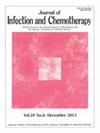A web questionnaire-based survey on post-COVID-19 condition for infectious disease specialists in Japan
IF 1.5
4区 医学
Q3 INFECTIOUS DISEASES
引用次数: 0
Abstract
Introduction
A nationwide survey was conducted to elucidate the current status and challenges of post-COVID-19 condition (PCC) management in Japanese medical institutions with infectious disease specialists, as PCC remains a significant health concern about accumulating knowledge regarding its impact on quality of life.
Materials and methods
Between January 18 and March 9, 2024, a web-based survey comprising up to 24 questions was administered to 880 infectious disease specialists nationwide. The survey investigated respondents' attributes and backgrounds, management experience, patient characteristics, treatment status, and PCC conditions among medical staff.
Results
Responses were obtained from 465 specialists across 47 prefectures (52.8 % response rate). Among the 324 hospital-affiliated respondents, 69.7 % had experience in managing PCC, whereas only 11.2 % had dedicated specialized outpatient clinics. Most respondents reported that PCC was predominantly observed in the 18–64 age group, with 80.5 % and 51.9 % of the respondents reporting patients with symptoms lasting over 3 and 12 months, respectively. In patients with symptoms persisting over 3 months, many respondents noted that neuropsychiatric manifestations including depression and forgetfulness were common. Treatment approaches included pharmacotherapy, rehabilitation, and counseling. Additionally, 27.4 % of institutions reported PCC cases among staff, with two-thirds requiring work leave.
Conclusion
Although many medical institutions with infectious disease specialists provide COVID-19 treatment, the establishment of specialized PCC outpatient clinics remains limited. This highlights the need for comprehensive long-term follow-up and support systems, particularly for healthcare workers affected by PCC, emphasizing the importance for developing effective return-to-work support systems.
日本传染病专家covid -19后状况的网络问卷调查
本研究开展了一项全国范围的调查,以阐明日本拥有传染病专家的医疗机构在covid -19后病情(PCC)管理方面的现状和挑战,因为PCC仍然是一个重要的健康问题,对其对生活质量的影响的知识不断积累。材料和方法在2024年1月18日至3月9日期间,对全国880名传染病专家进行了一项包含多达24个问题的网络调查。调查调查了受访者的属性和背景、管理经验、患者特征、治疗状况以及医务人员的PCC状况。结果从47个县的465名专家中获得了反馈,回复率为52.8%。在324家医院附属的受访者中,69.7%的人有管理PCC的经验,而只有11.2%的人有专门的专科门诊。大多数应答者报告PCC主要发生在18-64岁年龄组,80.5%和51.9%的应答者报告患者症状持续时间分别超过3个月和12个月。在症状持续超过3个月的患者中,许多受访者指出,包括抑郁和健忘在内的神经精神表现很常见。治疗方法包括药物治疗、康复和咨询。此外,27.4%的院校报告员工有投诉投诉个案,其中三分之二需要休假。结论虽然许多医疗机构都有传染病专家提供COVID-19治疗,但PCC专科门诊的建立仍然有限。这突出了需要全面的长期随访和支持系统,特别是对受PCC影响的卫生保健工作者,强调了开发有效的重返工作支持系统的重要性。
本文章由计算机程序翻译,如有差异,请以英文原文为准。
求助全文
约1分钟内获得全文
求助全文
来源期刊

Journal of Infection and Chemotherapy
INFECTIOUS DISEASES-PHARMACOLOGY & PHARMACY
CiteScore
4.10
自引率
4.50%
发文量
303
审稿时长
47 days
期刊介绍:
The Journal of Infection and Chemotherapy (JIC) — official journal of the Japanese Society of Chemotherapy and The Japanese Association for Infectious Diseases — welcomes original papers, laboratory or clinical, as well as case reports, notes, committee reports, surveillance and guidelines from all parts of the world on all aspects of chemotherapy, covering the pathogenesis, diagnosis, treatment, and control of infection, including treatment with anticancer drugs. Experimental studies on animal models and pharmacokinetics, and reports on epidemiology and clinical trials are particularly welcome.
 求助内容:
求助内容: 应助结果提醒方式:
应助结果提醒方式:


